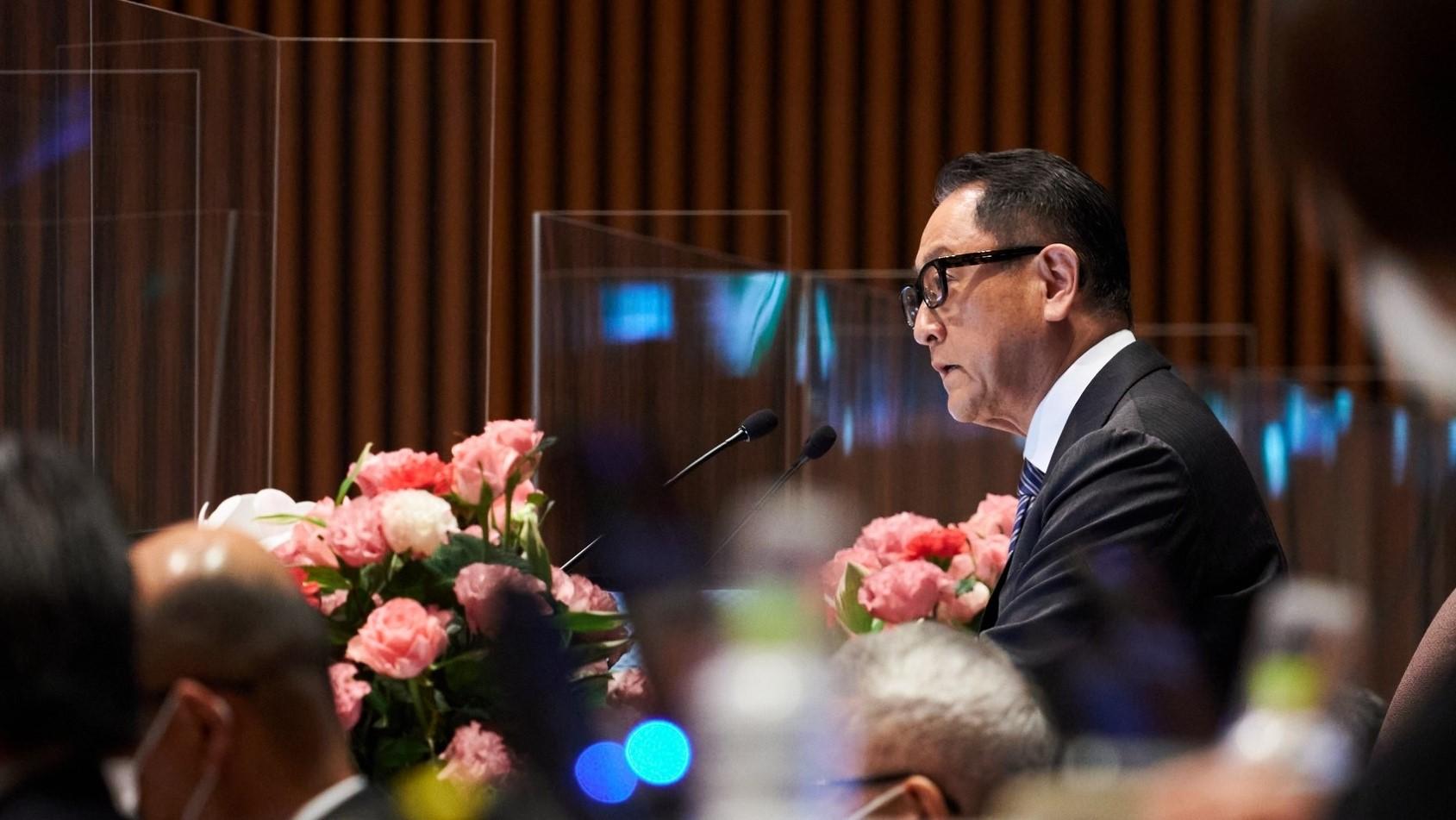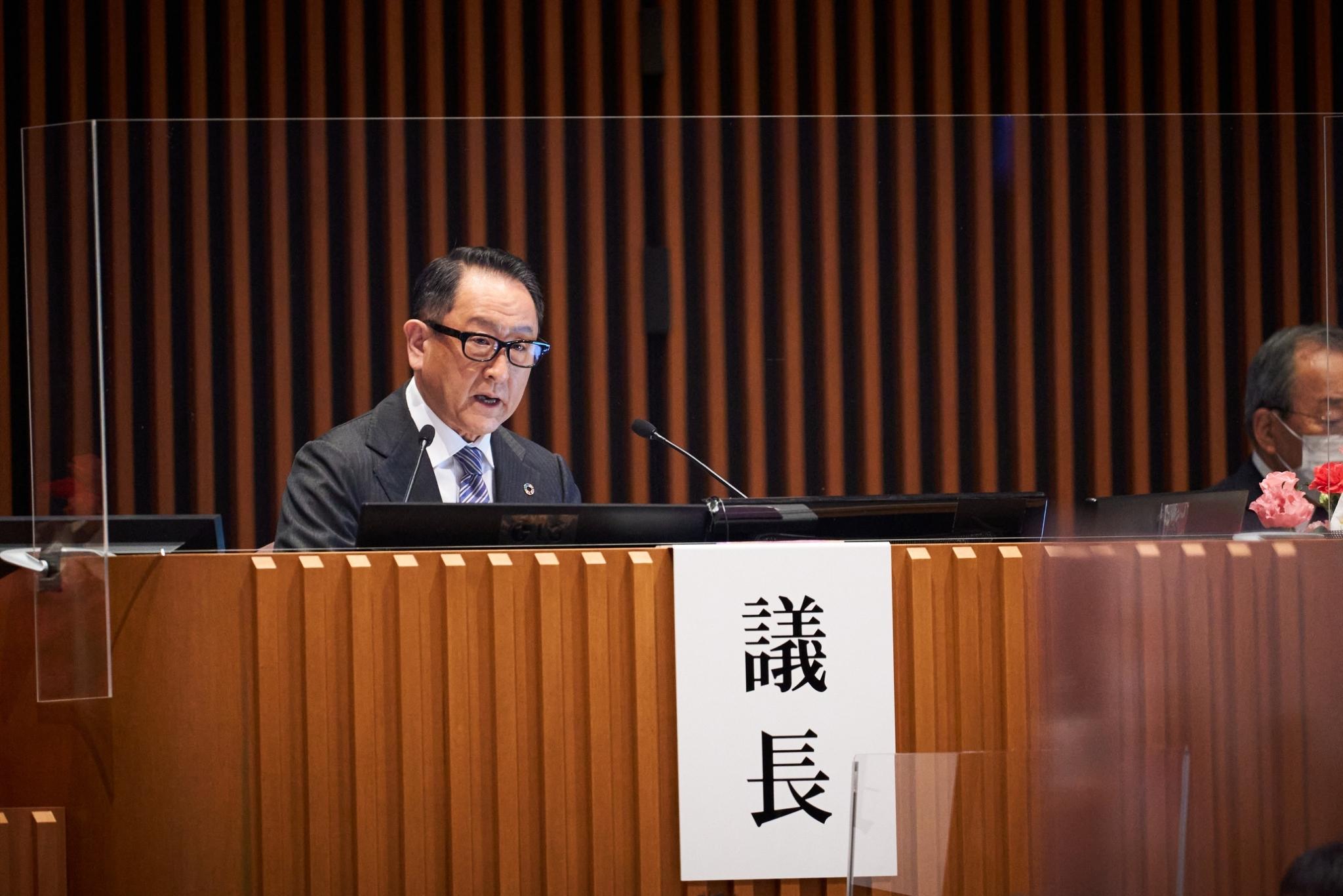
Akio Toyoda, at his 13th General Shareholders' Meeting as chairperson, looked back at the last 13 years and explained the clear changes he has seen at Toyota to shareholders.

Toyota held the General Shareholders’ Meeting at its headquarters in Toyota City, Aichi Prefecture on June 15, with 934 shareholders attending. Five proposed resolutions were approved, including the election of nine members of the board of directors.

Shareholders asked a wide variety of questions ranging from how to respond to chip shortage and carbon neutrality, to the progress on finding President Akio Toyoda’s successor.
Toyota Times now offers a three-part report on the meeting. This first part focuses on Akio’s closing message.
13 years of continuous effort
“I would like to share my thoughts before we begin voting on resolutions.” This is how Akio started his closing remarks after an hour and a half Q&A session. Shareholders turned their attention to him.

For the past four months, tragic, harrowing events have continued to unfold in Ukraine. I find myself struggling to come to terms with the reality of how war has devastated the lives and happiness of so many people.
As the world grows more divided, I once again remind myself: We are here to bring smiles to our customers and friends worldwide. And we want to create a world where everyone can find happiness, along with all Toyota stakeholders.
Over the past 13 years, I have been working to return Toyota to its origins, the philosophy of “producing happiness for all.”
“Let’s make ever-better cars.”
“Let’s aim to be best-in-town, rather than being the best in the world.”
“Let’s work for someone other than ourselves.”
I have repeated these messages and demonstrated Toyota’s philosophy and skills through action at genba time and again, both as president and as a master driver.
By pursuing a best-in-town approach, we can envision what makes our customers and stakeholders happy and what doesn’t.
Through focusing on making ever-better cars, we find that it takes more than just our individual capabilities. We realize that, from development to after-sales, a car has a life spanning more than 20 years, intertwined with the lives of our customers.
By bringing car development into the world of motorsport, the demanding conditions of racing allow us to hone both vehicles and people.
I have always felt it important to place car making within the context of such stories. To me, our customers and stakeholders are the protagonists of these stories, along with every individual working at Toyota’s genba.
Our products, above all else, represent our change. Today, Toyota offers a wide variety of products that have become the preferred choice of customers around the world. I believe this is because the people working at Toyota have changed.
I recently visited our Motomachi Plant. The Motomachi genba is underpinned by the many people, both inside and outside the company, who have provided support to ensure the success of our new project.
These diverse members have worked tirelessly with mutual respect to deliver ever-better cars to customers as soon as possible, by sharing expertise and making steady improvements.
In these efforts, I saw our colleagues striving to fulfill the philosophy of “producing happiness for all” through our time-honored skills of TPS.
Clear signs of real change at Toyota

I am grateful for such dedication, which I see as a clear sign of real change at Toyota.
Toyota is now transforming into a mobility company. Our future products and services may change, but even so, I believe in a mobility future that only carmakers can create.
When asked what we do, I want Toyota members to respond with pride, confidence, and ambition: I make cars. I see my mission as nurturing such individuals by passing on the legacy of Toyota’s skills and philosophy.
Akio’s voice turned a bit shaky when he touched on his mission of nurturing people confident and proud of making cars.
He became president of Toyota in 2009, right after the company plunged into the red due to a 15% vehicle sales decrease during the global financial crisis.
Almost a decade later, Toyota could prove it had changed when the COVID-19 pandemic caused a crisis even greater than in 2009. Akio was able to ensure unbroken profitability and demonstrate the company’s positive guidance to all stakeholders, thanks to long-term efforts in improving its break-even point.
More than anything, bringing about this change was the companywide pursuit of ever-better cars at Toyota. Akio noted that Toyota now offers a wide variety of products that have become the preferred choice of customers around the world.
In facing the company’s less product-centered management, Akio had long felt hesitant to be proud when saying Toyota was a true car company. But now, things have changed. Deep inside, he probably had an unspoken message for the next generation:
“We have finally become confident enough to say that we make cars. Take pride in what we make, even as we transform into a mobility company.”
Akio paused for a moment and then continued, trying to hold back tears.
We have reached this point after long years of struggle, thanks to those who have supported us through the good and the difficult times.
We would not have been able to change without the understanding and backing of you, our shareholders, and I would like to take this opportunity to express my heartfelt gratitude. Thank you very much.
We look forward to your continued generous support.

